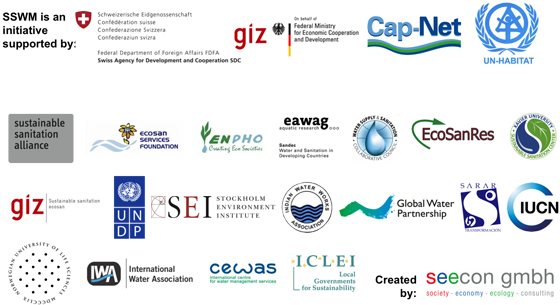Water resources around the world are under increasing pressure: Population growth and urbanisation, climate change and rapid industrialisation, expanding and intensifying agricultural production, and increasing demand of water for industry and energy production are all putting pressure on water resources. Around the world, water scarcity and conflicts seriously undermine progress towards achieving the Sustainable Development Goals. Although scarce, water resources are all too often used in an inefficient or unsustainable way and proper treatment and reuse of wastewater is today still rather an exception than the norm. As a consequence, ecosystems are contaminated and valuable nutrients lost.
Hundreds of well-established approaches and good practice examples for sustainable sanitation and water management are out there, but finding them can be long and arduous - it is easy to get lost in details.
This is where the SSWM Toolbox comes in!
The SSWM Toolbox is the most extensive collection of knowledge around sustainable sanitation and water management. It compiles thousands of “best of “ instruments – be that technologies, methodologies, behavioural change approaches or planning tools – geared to optimise sanitation and water management intervention at local level all curated in an easy-to-understand yet comprehensive way. It honours the fact that there are countless ways to approach and understand sustainable sanitation and water management and offers its users different “Perspectives” from which to explore the knowledge around sustainable sanitation and water management. The perspectives are like filters: they compile and structure the information that relate to a given focus theme, region or context. This allows you to quickly navigate to the content of your particular interest while promoting the holistic understanding of sustainable sanitation and water management. Of course, you can always also explore the contents through the alpha SSWM catalogue or via search function.
The SSWM Toolbox is for you, no matter if you are a decision maker, an NGO or CSO desk officer, an industrial water user, a farmer, a student or simply a person interested in making water and sanitation more sustainable.
OPEN SOURCE COPYRIGHT
The Toolbox follows an open source concept. To read more about this, read our disclaimer.
PARTNERS
This Toolbox has been realised by seecon in cooperation with a number of [2829-partners]:


